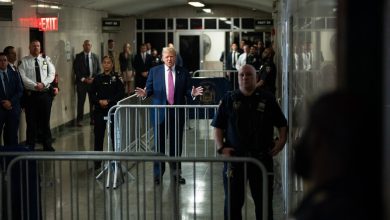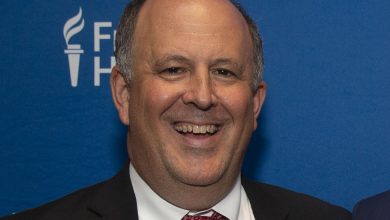The Race to Avoid Omicron Lockdowns


Lines to get tested for the coronavirus this week amid the spread of the Omicron variant.Credit…Roberto Schmidt/Agence France-Presse — Getty Images
Can Biden avoid new restrictions?
President Biden will lay out new efforts today to combat the Omicron variant, which accounted for 73 percent of new Covid-19 cases last week. The plan has a more urgent tone than the one he announced three weeks ago. But the big question is whether even these measures will be enough to avoid more aggressive pandemic restrictions.
Testing is taking center stage. The Biden administration will buy 500 million rapid tests to distribute free to the public, invoking the Defense Production Act to accelerate their production. It will also set up new federal testing sites, and is preparing to deploy 1,000 military medical professionals to help at overburdened hospitals.
It comes as the Omicron surge is continuing to disrupt the economy. People are increasingly worried that their sniffles might be Covid, lining up for hours to get tested and canceling holiday gatherings. The N.H.L. paused all games this week, becoming the first North American pro sports league to halt play en masse amid the spread of the new variant. More Broadway shows, including “Hamilton,” have canceled performances through Christmas.
But is all this enough? The free tests won’t be available until next month, and it’s not immediately clear where they’ll come from. While Biden and his advisers remain worried about whether the nation’s hospitals can withstand the Omicron surge, some public health experts are frustrated at the White House’s reluctance to take stronger steps like urging people to cancel travel plans. “This is not a speech about locking the country down,” Jen Psaki, the White House press secretary, told reporters yesterday.
More coronavirus news:
-
The owner of Fox News eliminated an option for workers to get tested weekly instead of showing proof of vaccination.
-
Former President Donald Trump told an audience that he had received a booster shot, and was booed.
HERE’S WHAT’S HAPPENING
Oracle makes a huge bet on health care. The tech giant agreed to buy Cerner, an electronic health records vendor, for $28.3 billion in its largest-ever acquisition. Behind the deal, according to analysts, is Oracle’s hope that it can gain more market share in the fast-growing cloud market.
Nikola pays $125 million to settle a securities fraud case. The S.E.C. found that the electric truck maker’s founder and former C.E.O., Trevor Milton, pumped up the price of Nikola’s shares with a series of misleading statements, which it said Nikola compounded with its own misleading product claims. Nikola neither admitted nor denied the accusations in the civil order.
Bridgewater’s C.E.O. moves closer to running for the Senate. David McCormick is creating an exploratory committee for a potential U.S. Senate campaign in Pennsylvania, and is expected to run his first television ad today. He would be the latest top financier to seek office after the former Carlyle co-C.E.O. Glenn Youngkin ran for governor of Virginia, and he might compete against Dr. Mehmet Oz, the celebrity physician.
Abby Joseph Cohen is retiring from Goldman Sachs. Over her 30-year career, Cohen became one of Wall Street’s most prominent researchers, particularly through her bullish market forecasts during the 1990s dot-com boom. She will step down at year end to become a professor at Columbia’s business school.
The eco-minded shoemaker Rothy’s is now worth $1 billion. The brand, known for its ballet flats made from recycled plastic bottles, sold a roughly 50 percent stake to the parent company of Havaianas, a maker of flip-flops. It’s the latest sign of the fashion industry’s embrace of sustainability.
Do the markets need a booster?
U.S. stock futures are up this morning, after falling for three trading days in a row. The market is still up nearly 22 percent for the year, but that volatility concerns many investors. Plenty of uncertainty remains, including from the highly transmissible Omicron variant, the still-cloudy outlooks for President Biden’s social spending plan and from the Fed’s interest rate hikes. The big question is whether these factors could finally take down the pandemic bull market.
Let’s explore the different arguments:
-
Yes. Investors’ expectations for high growth next year look increasingly misguided in light of Omicron and lower government spending. Analysts currently expect the S&P 500’s profits to jump nearly 9 percent, or over twice as fast as the broader economy, which may not be possible given the current rate of inflation. When companies start to lower earnings targets — or miss them — the markets will surely follow.
-
No. Stock market collapses are extremely rare without recessions, and there’s no sign that one is in store for 2022. While some recent job growth data has been disappointing, an increasing number of Americans are still finding new positions. And consumer spending continues to beat expectations.
-
Maybe? Stocks may not fall drastically, but they may not continue to surge either. This viewpoint has supporters: Savita Subramanian, Bank of America’s head of U.S. equity strategy, predicts that the S&P 500 will rise less than 1 percent next year, and said the market’s biggest problem was “lofty expectations.”
“It feels a bit like the 1990s and the birth of the internet all over again.”
– Sridhar Ramaswamy, the C.E.O. of a search engine start-up, on how cryptocurrency companies are increasingly one of the biggest draws for talent in Silicon Valley.
The notable C.E.O.s of 2021 …
Here are some of the top executives in the news this year — and our predictions for who will make big moves in 2022.
Vlad Tenev of Robinhood: Few companies and C.E.O.s have disrupted Wall Street like Robinhood and Tenev, particularly in 2021. First there was the meme stock rally. Later, a nearly $32 billion I.P.O., in which Robinhood sold as much as a third of the shares directly to its customers through its app. Not everyone is a fan: Tenev was memorably grilled by Congress, and in June, Robinhood was fined $70 million by FINRA — the largest imposed penalty in the regulator’s history — over accusations that it misled customers and the authorities. After its rocky I.P.O., the company’s shares have sunk to $18 each, or less than half of their offering price.
The Coronavirus Pandemic: Key Things to Know
The Omicron variant. The new Covid variant appears to be highly transmissible, though it remains unclear if it is less severe than other forms of the virus. New studies indicate that vaccines, and especially their boosters, may offer protection against severe disease.
Omicron and vaccines. A booster shot of the Moderna or Pfizer vaccine significantly raises the level of antibodies that can thwart the variant, the companies announced this month. Though all vaccines seem to prevent serious illness,the non-mRNA shots relied on by most of the world are unlikely to stop Omicron infections.
A new U.S. surge. The C.D.C said that the Omicron variant’s rapid spread in the U.S. may portend a surge in infections as soon as January, but cases are already spiking. On Dec. 17, New York officials reported the state’s highest single-day total of new cases. in some places, and many hospitals have reached capacity.
Biden’s vaccine mandate. A federal appeals panel on Dec. 17 reinstated a Biden administration rule requiring larger companies to mandate that their workers get vaccinated against Covid-19 or submit to weekly testing by Jan. 4. A day later, the Labor Department said that it would delay that deadline until Feb. 9.
Kids and schools. Pfizer said that a low dose of its vaccine did not produce an adequate immune response in 2- to 5-year-olds in ongoing clinical trials. Meanwhile, the C.D.C. announced “test-to-stay” guidelines that allow unvaccinated students exposed to the virus to stay in school if they remain asymptomatic.
Mark Zuckerberg of Meta: Zuckerberg transformed the social media giant this year in more than one way — including literally, when he changed its name to Meta from Facebook to allude to the “metaverse,” the virtual world that he has called the future of the internet. He also pushed Meta to be more aggressive in responding to controversies, including a trove of leaked internal documents that outlined how much the company knew about harmful effects of its products, questions about its role in spreading misinformation that contributed to the Jan. 6 Capitol riot, and an antitrust lawsuit filed by the Federal Trade Commission.
Jane Fraser of Citigroup: Fraser took the helm of the banking giant in March. She shook up its culture, instating “Zoom-free Fridays” and promising that most employees would be able to work from home two days a week on a permanent basis. But Citi’s shares are still underperforming those of its competitors, and most of Fraser’s enormous turnaround job still lies ahead.
… and the C.E.O.s to keep an eye on in 2022
The pandemic stock leaders: If 2022 turns out to be a return to normal, the C.E.O.s of the companies that saw the biggest boost from the pandemic might be the ones trying to figure out how to stay afloat. Shares of Peloton have fallen 61 percent over the past three months, while those in Moderna and Zoom have sunk about 30 percent each in the same period. Peloton’s chief, John Foley, must reverse a sales slump driven by gym reopenings. Zoom’s C.E.O., Eric Yuan, must convince investors that its core video-conferencing software can adapt to a new era of hybrid work. And while the spread of the Omicron variant of the coronavirus may amplify demand for boosters, Moderna’s leader, Stéphane Bancel, must prove that his company has more than one viable vaccine.
New on the job: Two Black women took over Fortune 500 companies: Rosalind Brewer was picked to run Walgreens in March — and has moved the pharmacy chain further into health care and away from retail, while Thasunda Brown Duckett, a top JPMorgan Chase executive, began leading the finance giant TIAA in May. Andy Jassy replaced Jeff Bezos as Amazon’s chief in July, and must now fend off fierce scrutiny from regulators on everything from antitrust to workplace safety. And Parag Agrawal, who became Twitter’s C.E.O. in November, will have to prove that he can deliver on the social network’s ambitious growth targets.
R.J. Scaringe of Rivian: After nearly 10 years in stealth mode and holding one of the biggest I.P.O.s of this year, Scaringe’s vehicle maker is under pressure to deliver on its promise of doing for electric trucks what Tesla did for electric cars. Despite having sold just 386 vehicles as of last week, Rivian’s market cap is now bigger than that of Ford (an investor) and on par with that of General Motors. Scaringe has big expansion plans next year, including breaking ground on a $5 billion factory in Georgia and producing 100,000 delivery vehicles for Amazon, another investor.
Mary Barra of G.M.: Barra expects a big payoff from the investments that the carmaker has made in electric vehicles. In October, she said the company’s annual revenue aimed to roughly double by 2030, to about $280 billion, growth driven mostly by new electric trucks and cars, but also by new revenue streams from software and services. In 2022, investors will undoubtedly keep an eye on the company’s progress in those ambitious goals.
THE SPEED READ
Deals
-
Nordstrom has reportedly hired the consulting firm AlixPartners to study a potential spinoff of its Nordstrom Rack outlet business. (Bloomberg)
-
The Hong Kong insurer FWD called off plans to go public in the U.S. (WSJ)
-
Elliott Management and Vista Equity Partners are reportedly weighing a joint bid for the workplace software maker Citrix. (Bloomberg)
Policy
-
Biogen cut the price of its contentious Alzheimer’s drug, Aduhelm, as health advocates called on federal regulators to pull it from the market. (NYT)
-
California’s attorney general and others sued Walmart, accusing the retailer of illegally dumping hazardous materials in landfills. (Insider)
-
Germany’s new government named Joachim Nagel, a veteran of the Bundesbank, as the central bank’s new chief. (NYT)
-
The E.P.A. finalized new fuel efficiency standards for cars that would require them to get 40 miles per gallon by 2026. (MarketWatch)
Best of the rest
-
Auction houses like Christie’s, Phillips and Sotheby’s have set new sales records this year. (WSJ)
-
“How the Copy Cats Came for Clubhouse” (NYT)
-
TikTok has become the next big draw for retailers’ ad spending. (NYT)
-
Starbucks said it would bargain “in good faith” with newly unionized workers at a store in Buffalo. (NYT)
-
A British court ordered the ruler of Dubai, Sheikh Mohammed bin Rashid al-Maktoum, to pay his former wife a divorce settlement that could surpass £500 million ($662 million). (Guardian)
Thanks for reading! We’ll see you tomorrow.
We’d like your feedback! Please email thoughts and suggestions to [email protected].




